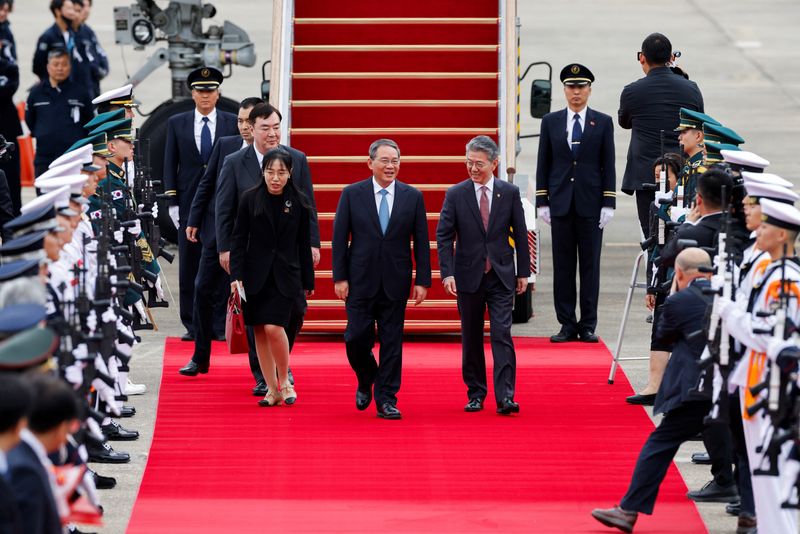By Hyonhee Shin and Jack Kim
SEOUL (Reuters) -Chinese Premier Li Qiang praised what he called a restart in relations with Japan and South Korea as he met their leaders for the first three-way talks in four years on Monday, agreeing to revive trade and security dialogues hampered by global tensions.
The Chinese premier met South Korean President Yoon Suk Yeol and Japanese Prime Minister Fumio Kishida in Seoul with efforts to revitalise three-party free trade agreement negotiations, stalled since 2019, high on the agenda.
As the summit opened, Li said the meeting was "both a restart and a new beginning" and called for the comprehensive resumption of cooperation between East Asia's economic powerhouses.
But for this to happen politics should be separated from economic and trade issues, he added, calling for an end to protectionism and the decoupling of supply chains.
"For China, South Korea, and Japan, our close ties will not change, the spirit of cooperation achieved through crisis response will not change and our mission to safeguard regional peace and stability will not change," Li said.
The meeting itself was seen as a mark of progress for three countries whose relations are marked as much by suspicion and rancour as by constructive engagement.
"The trilateral summit is more about reducing frictions than reshaping geopolitics," said Leif-Eric Easley, a professor at Ewha University in Seoul.
China and U.S.-allied South Korea and Japan are trying to manage mutual distrust amid the rivalry between Beijing and Washington, tensions over democratically ruled Taiwan, which China claims as its own, and North Korea's nuclear programme.
Yoon and Kishida have charted a closer course with each other and to Washington, embarking on unprecedented three-way cooperation with the United States on military and other measures.
U.S. President Joe Biden has raised barriers to Chinese imports, hiking tariffs on an array of Chinese imports including electric vehicle (EV) batteries and computer chips. Donald Trump, his rival in the November presidential election, has floated tariffs of 60% or higher on all Chinese goods.
"We need to promote multipolarity in the world and oppose the formation of blocs or camps," Li said.
BOOSTING COOPERATION
A joint declaration released after the meeting called for China, Japan, and South Korea to formalise regular communication at the highest levels, and collaborate on climate change, conservation, health, trade and international peace, among other areas.
The declaration set a goal of boosting the number of people-to-people exchanges to 40 million by 2030 through exchanges in culture, tourism and education.
The leaders also issued separate joint statements on pandemic preparation and intellectual property protection.
On North Korea, Yoon and Kishida called on Pyongyang not to carry out a planned rocket launch carrying a space satellite, which they say uses ballistic missile technology banned by United Nations Security Council resolutions.
North Korea ignored those calls and attempted to launch a satellite on Monday, but said it ended in failure when a newly developed rocket engine exploded in flight.
Li called for all parties to practice restraint and prevent further complication of the situation on the Korean peninsula, but did not mention the satellite. China is North Korea's only military ally, its largest trade partner, and along with Russia, has called for U.N. sanctions on North Korea to be eased.
North Korea condemned the three countries for committing to denuclearise the Korean peninsula, describing their joint declaration as a "grave political provocation" that violates its sovereignty.
TRADE RELATIONS
The increasingly competitive trade relationship between China, South Korea and Japan has been further tested by U.S. calls for its allies to shift their supply chains for key products, such as semiconductors, away from China.
Yoon said the leaders agreed to build a transparent and predictable trade and supply chain environment, but did not elaborate.
The leaders also attended a forum with top business executives from the three countries who noted that cooperation had not reached its potential due to the global challenges, but agreed that industry would work together to support trade and stabilise supply chains.

"Relations would advance further if China allows better access for Japanese and Korean diplomats in Beijing and improves the business environment for foreign companies," Easley said.
At their last FTA negotiation in November 2019, the three countries agreed on liberalisation at a level higher than the Regional Comprehensive Economic partnership (RCEP), of which they are all members, encompassing areas from trade of goods and services to investment, customs, competition and e-commerce.